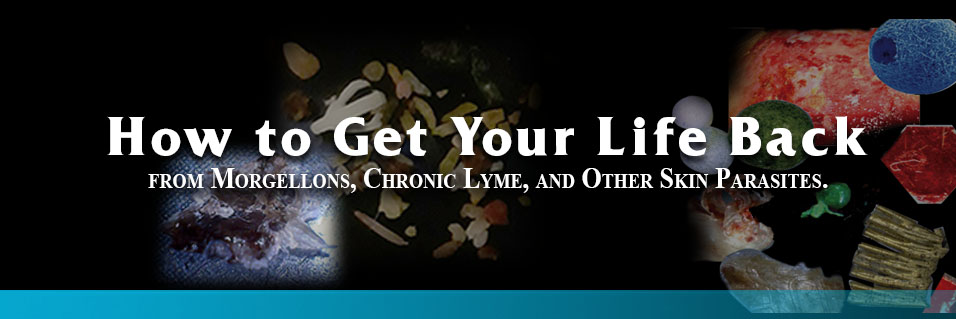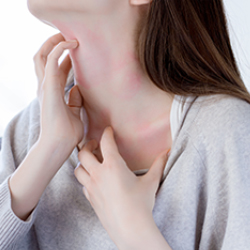This is something bizarre, yet the reality compounds Morgellons Disease. One of the main symptoms of Norgellons Disease is itching of the skin. Of all the tens of hundreds of questionnaires I've analyzed I don't remember anyone not having itchy skin. And what do we all do when our skin itches? Answer: we do the obvious, we scratch it with our finger nails. And since the itching can be relentless, we can be scratching our skin relentlessly too. Even to the point of creating scratch marks on our skin. But, what can seem like a harmless meaningless reaction - scratching your skin - can be a lot more than skin deep.
Recent research finds that by scratching your skin, your immune system can be damaged. It can shift the balance of immune functioning in your digestive tract to create food allergies along with leaky gut syndrome that releases toxins into your blood stream.
Several of my blog posts have been about how Monsanto's glyphosate contributes to the "Fall of your digestive tract," but here we have self induced leaky gut adding to the "perfect storm," I recently written about in blog post titled, "Is There a Cure for Morgellons And Crazy Mites?".
Here's the rub, pun intended. A study conducted at Boston Children's Hospital finds that scratching of your skin may well set off a series of immune responses that trigger mast cells. These are the immune cells connected to allergic reactions in the small intestine.
According to an article in Frontiers in Immunology Jan 6, 2016 "Mast cells are immune cells of the myeloid lineage and are present in connective tissues throughout the body. The activation and degranulation of mast cells significantly modulates many aspects of physiological and pathological conditions in various settings. With respect to normal physiological functions, mast cells are known to regulate vasodilation, vascular homeostasis, innate and adaptive immune responses, angiogenesis, and venom detoxification. On the other hand, mast cells have also been implicated in the pathophysiology of many diseases, including allergy, asthma, anaphylaxis, gastrointestinal disorders, many types of malignancies, and cardiovascular diseases. This review summarizes the current understanding of the role of mast cells in many pathophysiological conditions."
What happens is that scratching your skin causes mast cells to expand which can lead to leaky gut syndrome as reported in an article appearing in Immunity published 4/23/19 titled "Mechanical Skin Injury Promotes Food Anaphylaxis by Driving Intestinal Mast Cell Expansion," As the mast cells expand (inflame) it can lead to leaky gut syndrome which in turn leads to toxins and allergens being leaked through the small intestinal wall into the blood stream
As mast cells expand, their actions can lead to leaky gut syndrome, a condition that compromises the intestinal walls and allows toxins and allergens to enter the blood stream.
The scientists find that it's especially a problem for those suffering with atopic dermatitis (dry, itchy skin caused by a type of eczema).
According to these scientists, this is particuarly a problem for people with atopic dermatitis, a type of eczema that causes dry, itchy skin which has been known to be connected to food allergies.
Well, hello to those suffering from Morgellons, Mites, and Collembola. Seems that scratching is our middle name. The labs results show scratching the skin produces a protein, (IL33) which seeps into the bloodstream and ends up in the digestive tract where IL33 reacts with the cells which line the intestine in such as way as to expand the mast cells.
As the mast cells expand, the lining of the small intestine become more permeable, creating bigger larger spaces in the intestinal wall that let allergens and other undesirable substances to enter the blood stream.
Now here's another kick in the pants. When you see someone else scratch their skin, it can be like watching someone yawn and you end up yawning. They call is socially contagious so when you see someone else scratching, you may feel powerless to also scratch your skin.
Researcher find that if we're anything like mice, and they use mice and rats for most studies related to human behavior, there is a social contagion as reported in an article titled, "Molecular and neural basis of contagious itch behavior in mice, " in Pubmed.gov 2/17. It's like the scratching is hardwired in the brain.
The lab studies show that when you see someone else scratch themselves, a part of the brain identified as the suprachiasmatic nucleus (SCN) sends out a chemical signal that creates the sensation of your skin itching.
"It's an innate behavior and an instinct," says researcher Zhou-Feng Chen. "We've been able to show that a single chemical and a single receptor are all that's necessary to mediate this particular behavior. The next time you scratch or yawn in response to someone else doing it, remember it's really not a choice nor a psychological response; it's hardwired into your brain."
Finding real relief
So, the answer is to stop scratching your skin, right? That's like asking a toddler to be quiet. Yet, it does point out that less itching will pay off big time. With a seven year track record, our Nature's Gift® debriding soap and the creams, lotions, and gels made from it have been the best approach to reduce itching over the long run. And of course, the King DietSM makes all this possible.
Yet, until you have your life back, there will be itching and scratching and the mast cells will be stimulated. Another goal is to strengthen the muscosa by feeding the cells with their natural food, L-glutamine, and creating a healthy gut by restoring the flora destroyed by glyphosate with Restore which is a formula of specific minerals to restore gut health. Both L-glutamine and Restore are part of the Morgellons Pack Plus.
|



